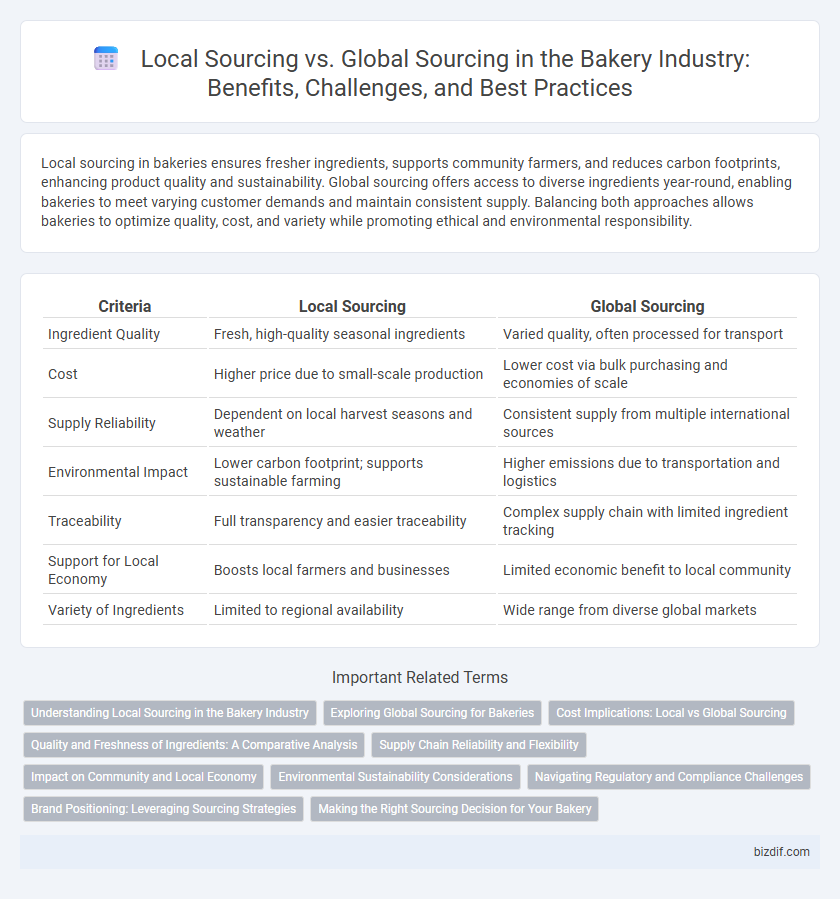Local sourcing in bakeries ensures fresher ingredients, supports community farmers, and reduces carbon footprints, enhancing product quality and sustainability. Global sourcing offers access to diverse ingredients year-round, enabling bakeries to meet varying customer demands and maintain consistent supply. Balancing both approaches allows bakeries to optimize quality, cost, and variety while promoting ethical and environmental responsibility.
Table of Comparison
| Criteria | Local Sourcing | Global Sourcing |
|---|---|---|
| Ingredient Quality | Fresh, high-quality seasonal ingredients | Varied quality, often processed for transport |
| Cost | Higher price due to small-scale production | Lower cost via bulk purchasing and economies of scale |
| Supply Reliability | Dependent on local harvest seasons and weather | Consistent supply from multiple international sources |
| Environmental Impact | Lower carbon footprint; supports sustainable farming | Higher emissions due to transportation and logistics |
| Traceability | Full transparency and easier traceability | Complex supply chain with limited ingredient tracking |
| Support for Local Economy | Boosts local farmers and businesses | Limited economic benefit to local community |
| Variety of Ingredients | Limited to regional availability | Wide range from diverse global markets |
Understanding Local Sourcing in the Bakery Industry
Local sourcing in the bakery industry emphasizes using ingredients sourced from nearby farms and suppliers, promoting freshness and supporting community economies. This approach reduces transportation costs and carbon footprints while ensuring seasonal and high-quality raw materials like flour, fruits, and dairy. Bakers relying on local sourcing often highlight transparency and sustainability, appealing to consumers seeking authentic and environmentally conscious products.
Exploring Global Sourcing for Bakeries
Global sourcing for bakeries expands access to a diverse range of high-quality ingredients such as specialty flours, exotic spices, and unique sweeteners unavailable locally. It enables competitive pricing and consistency in supply, essential for large-scale production and innovative product development. Partnering with international suppliers also allows bakeries to tap into emerging culinary trends and cater to a broader customer market.
Cost Implications: Local vs Global Sourcing
Local sourcing for bakeries often reduces transportation and import expenses, leading to lower overall costs and fresher ingredients that enhance product quality. In contrast, global sourcing can offer lower raw material prices due to economies of scale but may incur higher shipping fees, tariffs, and longer lead times, increasing total costs. Balancing these factors depends on the bakery's scale, supplier reliability, and ingredient specificity to optimize cost efficiency.
Quality and Freshness of Ingredients: A Comparative Analysis
Local sourcing in bakeries ensures superior freshness and flavor by reducing the time between harvest and ingredient use, contributing to high-quality baked goods. Global sourcing offers access to diverse, specialty ingredients not available locally but poses challenges in maintaining optimum freshness due to longer transportation times. Balancing local and global sourcing strategies allows bakeries to achieve quality standards while meeting varied ingredient demands.
Supply Chain Reliability and Flexibility
Local sourcing in bakery supply chains enhances reliability by reducing transit times and minimizing disruptions from global logistics challenges, ensuring fresher ingredients and consistent production schedules. Global sourcing offers flexibility through access to diverse raw materials and cost advantages, but it faces risks like longer lead times and vulnerability to international supply chain disruptions. Balancing local and global sourcing strategies optimizes supply chain robustness and responsiveness for bakery operations.
Impact on Community and Local Economy
Local sourcing in bakery operations strengthens the community by supporting nearby farmers and suppliers, which boosts the local economy and creates jobs. It reduces transportation emissions, ensuring fresher ingredients and promoting sustainability within the region. Global sourcing may offer cost advantages but often diminishes the economic benefits for local businesses and undermines community resilience.
Environmental Sustainability Considerations
Local sourcing in bakeries reduces carbon emissions by minimizing transportation distances, promoting fresher ingredients with lower environmental footprints. Global sourcing offers diversity in ingredients but often increases greenhouse gas emissions due to long-distance shipping and complex supply chains. Prioritizing local suppliers supports sustainable agriculture practices and decreases packaging waste, aligning with eco-friendly bakery operations.
Navigating Regulatory and Compliance Challenges
Local sourcing in bakery ensures fresher ingredients and easier compliance with regional food safety standards, reducing the complexity of meeting diverse regulations. Global sourcing introduces challenges such as navigating varying import/export restrictions, differing quality certifications, and compliance with international food safety laws like FDA, EFSA, and Codex Alimentarius. Effective management of these regulatory frameworks is crucial to maintain product integrity, ensure consumer safety, and avoid legal penalties in the bakery supply chain.
Brand Positioning: Leveraging Sourcing Strategies
Local sourcing in bakery enhances brand positioning by emphasizing freshness, quality, and community support, which appeals to consumers prioritizing sustainability and authenticity. Global sourcing allows bakeries to diversify ingredient options and maintain cost efficiency, projecting a competitive, innovative brand image. Strategic blending of local and global sourcing optimizes supply reliability while reinforcing a bakery's unique market identity.
Making the Right Sourcing Decision for Your Bakery
Selecting between local and global sourcing for bakery ingredients hinges on factors like ingredient freshness, cost efficiency, and supply chain reliability. Local sourcing enhances product quality through fresher ingredients and supports community businesses, while global sourcing offers access to a wider variety of ingredients and potentially lower costs due to economies of scale. Evaluating your bakery's specific needs, customer preferences, and seasonal availability ensures an optimized sourcing strategy that balances quality, sustainability, and profitability.
Local sourcing vs Global sourcing Infographic

 bizdif.com
bizdif.com